Business Ethics and Responsible Management in Hospitality Sector
VerifiedAdded on 2023/06/12
|12
|4100
|456
Report
AI Summary
This report examines business ethics and responsible management within the hospitality industry. It identifies key ethical issues such as employee theft, unethical leadership, and cleanliness, and discusses their impact on stakeholders including employees, shareholders, customers, government, and suppliers. The report explores the role of business in society, emphasizing corporate social responsibility and the importance of ethical practices for brand reputation. It also analyzes the Utilitarianism theory of ethics, highlighting its advantages and disadvantages in the context of the hospitality sector. Furthermore, the report touches upon ethical leadership management, reflection and concludes by recommending the adoption of strong ethical policies to foster a positive brand image and ensure long-term success.
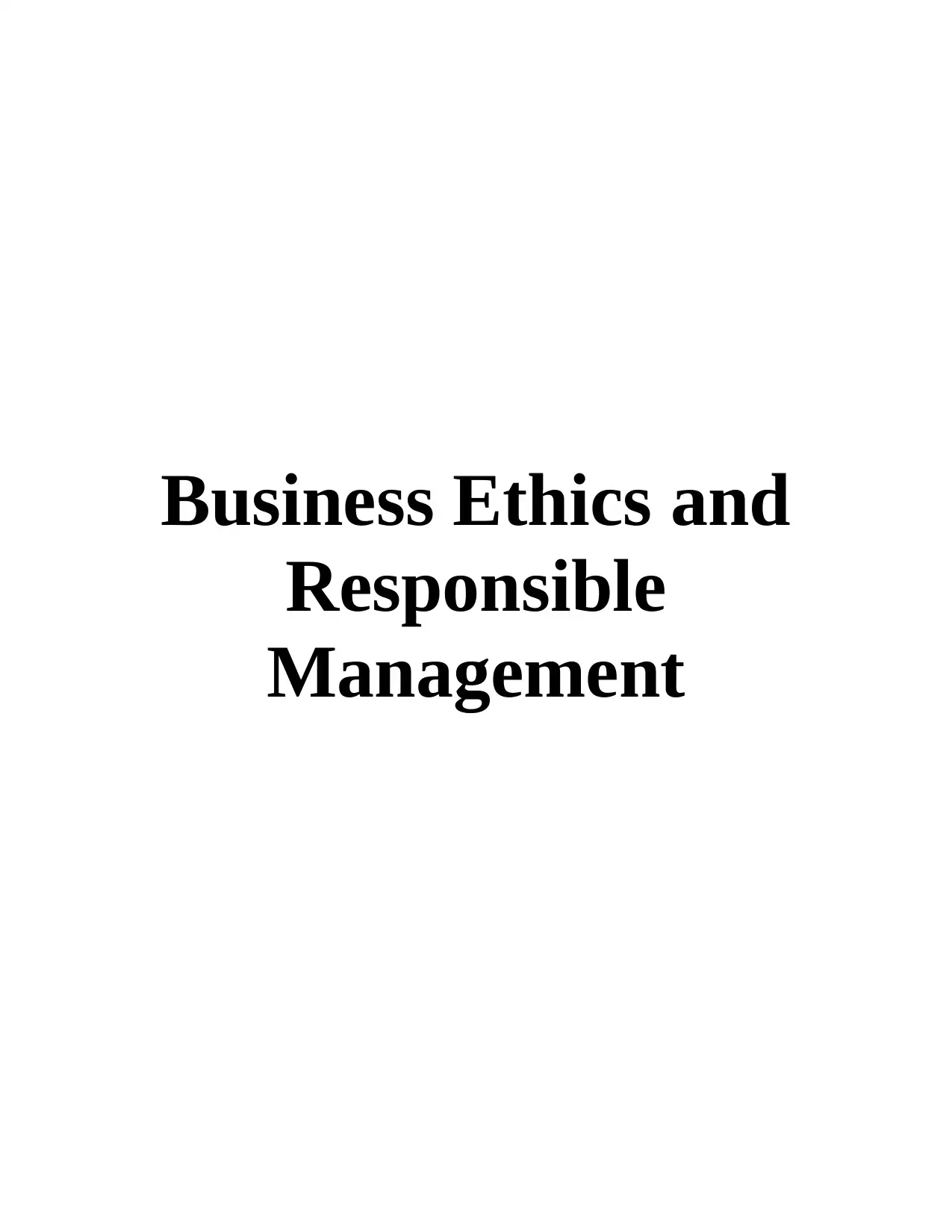
Business Ethics and
Responsible
Management
Responsible
Management
Paraphrase This Document
Need a fresh take? Get an instant paraphrase of this document with our AI Paraphraser
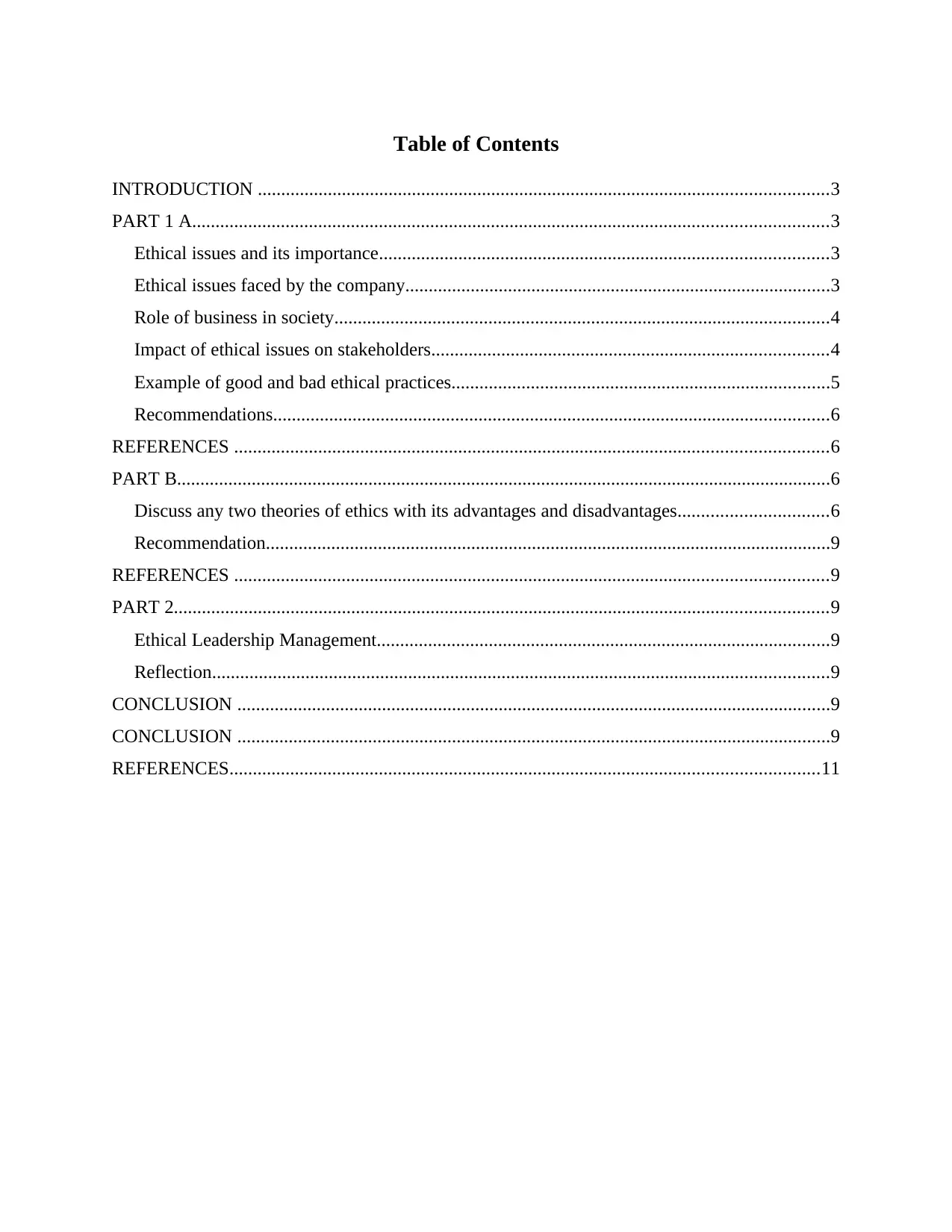
Table of Contents
INTRODUCTION ..........................................................................................................................3
PART 1 A........................................................................................................................................3
Ethical issues and its importance................................................................................................3
Ethical issues faced by the company...........................................................................................3
Role of business in society..........................................................................................................4
Impact of ethical issues on stakeholders.....................................................................................4
Example of good and bad ethical practices.................................................................................5
Recommendations.......................................................................................................................6
REFERENCES ...............................................................................................................................6
PART B............................................................................................................................................6
Discuss any two theories of ethics with its advantages and disadvantages................................6
Recommendation.........................................................................................................................9
REFERENCES ...............................................................................................................................9
PART 2............................................................................................................................................9
Ethical Leadership Management.................................................................................................9
Reflection....................................................................................................................................9
CONCLUSION ...............................................................................................................................9
CONCLUSION ...............................................................................................................................9
REFERENCES..............................................................................................................................11
INTRODUCTION ..........................................................................................................................3
PART 1 A........................................................................................................................................3
Ethical issues and its importance................................................................................................3
Ethical issues faced by the company...........................................................................................3
Role of business in society..........................................................................................................4
Impact of ethical issues on stakeholders.....................................................................................4
Example of good and bad ethical practices.................................................................................5
Recommendations.......................................................................................................................6
REFERENCES ...............................................................................................................................6
PART B............................................................................................................................................6
Discuss any two theories of ethics with its advantages and disadvantages................................6
Recommendation.........................................................................................................................9
REFERENCES ...............................................................................................................................9
PART 2............................................................................................................................................9
Ethical Leadership Management.................................................................................................9
Reflection....................................................................................................................................9
CONCLUSION ...............................................................................................................................9
CONCLUSION ...............................................................................................................................9
REFERENCES..............................................................................................................................11
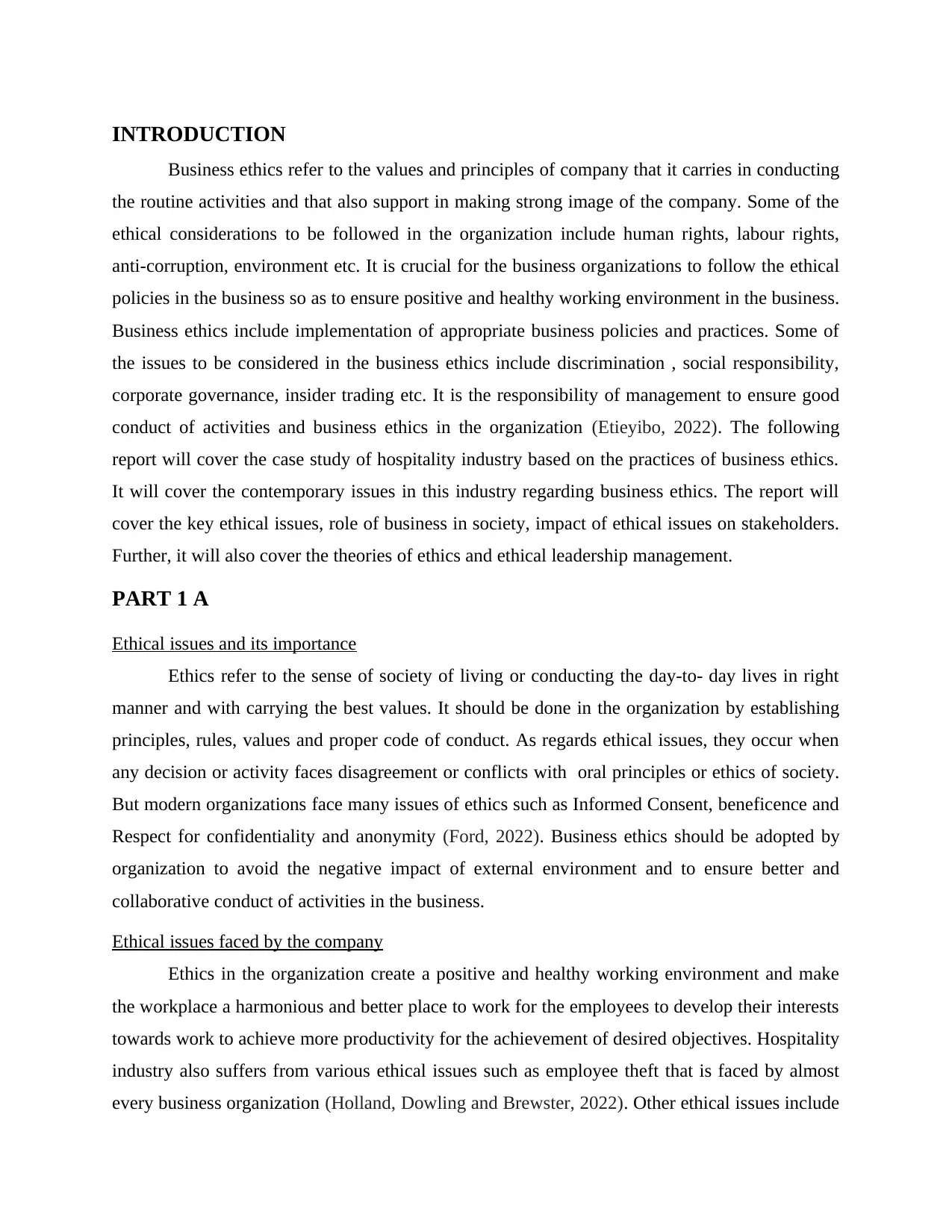
INTRODUCTION
Business ethics refer to the values and principles of company that it carries in conducting
the routine activities and that also support in making strong image of the company. Some of the
ethical considerations to be followed in the organization include human rights, labour rights,
anti-corruption, environment etc. It is crucial for the business organizations to follow the ethical
policies in the business so as to ensure positive and healthy working environment in the business.
Business ethics include implementation of appropriate business policies and practices. Some of
the issues to be considered in the business ethics include discrimination , social responsibility,
corporate governance, insider trading etc. It is the responsibility of management to ensure good
conduct of activities and business ethics in the organization (Etieyibo, 2022). The following
report will cover the case study of hospitality industry based on the practices of business ethics.
It will cover the contemporary issues in this industry regarding business ethics. The report will
cover the key ethical issues, role of business in society, impact of ethical issues on stakeholders.
Further, it will also cover the theories of ethics and ethical leadership management.
PART 1 A
Ethical issues and its importance
Ethics refer to the sense of society of living or conducting the day-to- day lives in right
manner and with carrying the best values. It should be done in the organization by establishing
principles, rules, values and proper code of conduct. As regards ethical issues, they occur when
any decision or activity faces disagreement or conflicts with oral principles or ethics of society.
But modern organizations face many issues of ethics such as Informed Consent, beneficence and
Respect for confidentiality and anonymity (Ford, 2022). Business ethics should be adopted by
organization to avoid the negative impact of external environment and to ensure better and
collaborative conduct of activities in the business.
Ethical issues faced by the company
Ethics in the organization create a positive and healthy working environment and make
the workplace a harmonious and better place to work for the employees to develop their interests
towards work to achieve more productivity for the achievement of desired objectives. Hospitality
industry also suffers from various ethical issues such as employee theft that is faced by almost
every business organization (Holland, Dowling and Brewster, 2022). Other ethical issues include
Business ethics refer to the values and principles of company that it carries in conducting
the routine activities and that also support in making strong image of the company. Some of the
ethical considerations to be followed in the organization include human rights, labour rights,
anti-corruption, environment etc. It is crucial for the business organizations to follow the ethical
policies in the business so as to ensure positive and healthy working environment in the business.
Business ethics include implementation of appropriate business policies and practices. Some of
the issues to be considered in the business ethics include discrimination , social responsibility,
corporate governance, insider trading etc. It is the responsibility of management to ensure good
conduct of activities and business ethics in the organization (Etieyibo, 2022). The following
report will cover the case study of hospitality industry based on the practices of business ethics.
It will cover the contemporary issues in this industry regarding business ethics. The report will
cover the key ethical issues, role of business in society, impact of ethical issues on stakeholders.
Further, it will also cover the theories of ethics and ethical leadership management.
PART 1 A
Ethical issues and its importance
Ethics refer to the sense of society of living or conducting the day-to- day lives in right
manner and with carrying the best values. It should be done in the organization by establishing
principles, rules, values and proper code of conduct. As regards ethical issues, they occur when
any decision or activity faces disagreement or conflicts with oral principles or ethics of society.
But modern organizations face many issues of ethics such as Informed Consent, beneficence and
Respect for confidentiality and anonymity (Ford, 2022). Business ethics should be adopted by
organization to avoid the negative impact of external environment and to ensure better and
collaborative conduct of activities in the business.
Ethical issues faced by the company
Ethics in the organization create a positive and healthy working environment and make
the workplace a harmonious and better place to work for the employees to develop their interests
towards work to achieve more productivity for the achievement of desired objectives. Hospitality
industry also suffers from various ethical issues such as employee theft that is faced by almost
every business organization (Holland, Dowling and Brewster, 2022). Other ethical issues include
⊘ This is a preview!⊘
Do you want full access?
Subscribe today to unlock all pages.

Trusted by 1+ million students worldwide
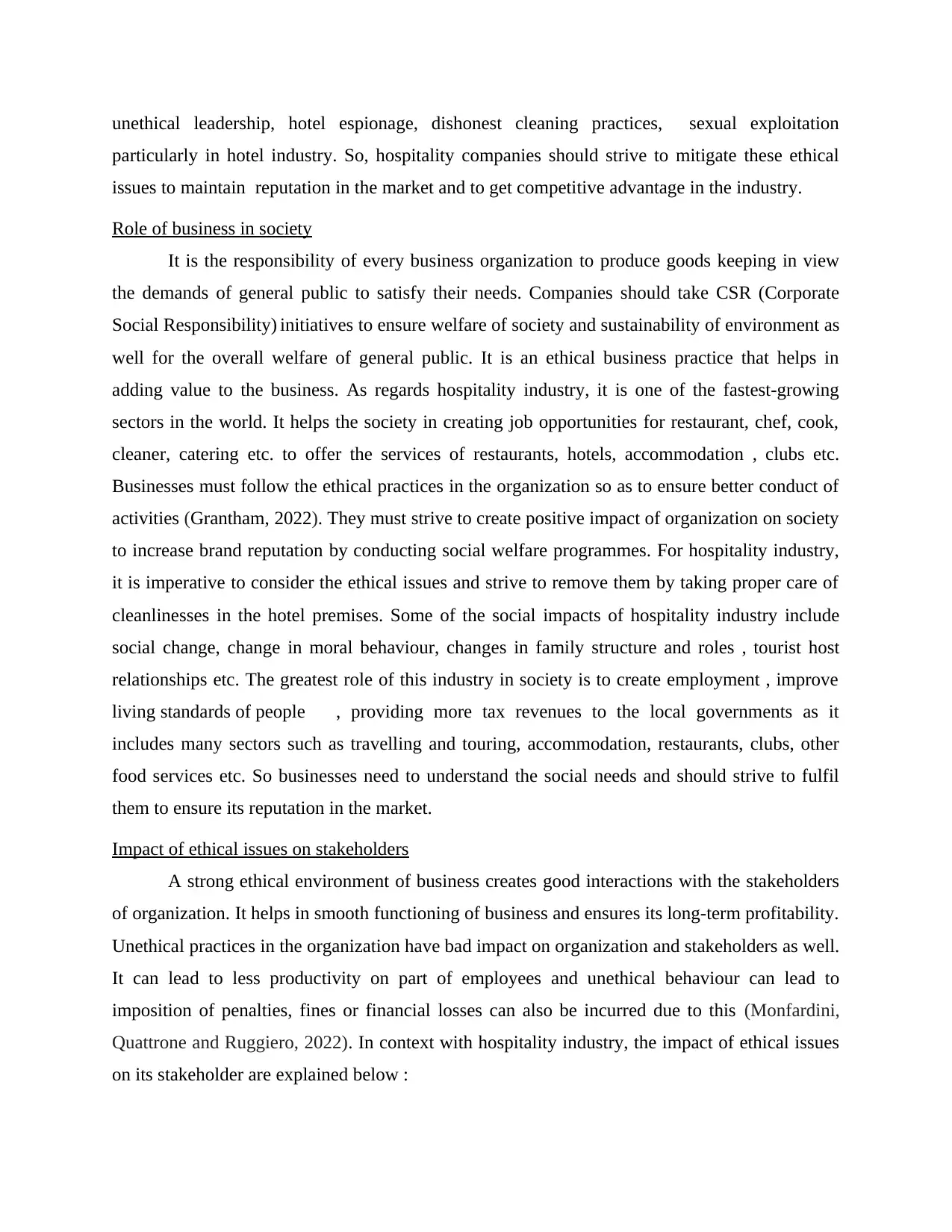
unethical leadership, hotel espionage, dishonest cleaning practices, sexual exploitation
particularly in hotel industry. So, hospitality companies should strive to mitigate these ethical
issues to maintain reputation in the market and to get competitive advantage in the industry.
Role of business in society
It is the responsibility of every business organization to produce goods keeping in view
the demands of general public to satisfy their needs. Companies should take CSR (Corporate
Social Responsibility) initiatives to ensure welfare of society and sustainability of environment as
well for the overall welfare of general public. It is an ethical business practice that helps in
adding value to the business. As regards hospitality industry, it is one of the fastest-growing
sectors in the world. It helps the society in creating job opportunities for restaurant, chef, cook,
cleaner, catering etc. to offer the services of restaurants, hotels, accommodation , clubs etc.
Businesses must follow the ethical practices in the organization so as to ensure better conduct of
activities (Grantham, 2022). They must strive to create positive impact of organization on society
to increase brand reputation by conducting social welfare programmes. For hospitality industry,
it is imperative to consider the ethical issues and strive to remove them by taking proper care of
cleanlinesses in the hotel premises. Some of the social impacts of hospitality industry include
social change, change in moral behaviour, changes in family structure and roles , tourist host
relationships etc. The greatest role of this industry in society is to create employment , improve
living standards of people , providing more tax revenues to the local governments as it
includes many sectors such as travelling and touring, accommodation, restaurants, clubs, other
food services etc. So businesses need to understand the social needs and should strive to fulfil
them to ensure its reputation in the market.
Impact of ethical issues on stakeholders
A strong ethical environment of business creates good interactions with the stakeholders
of organization. It helps in smooth functioning of business and ensures its long-term profitability.
Unethical practices in the organization have bad impact on organization and stakeholders as well.
It can lead to less productivity on part of employees and unethical behaviour can lead to
imposition of penalties, fines or financial losses can also be incurred due to this (Monfardini,
Quattrone and Ruggiero, 2022). In context with hospitality industry, the impact of ethical issues
on its stakeholder are explained below :
particularly in hotel industry. So, hospitality companies should strive to mitigate these ethical
issues to maintain reputation in the market and to get competitive advantage in the industry.
Role of business in society
It is the responsibility of every business organization to produce goods keeping in view
the demands of general public to satisfy their needs. Companies should take CSR (Corporate
Social Responsibility) initiatives to ensure welfare of society and sustainability of environment as
well for the overall welfare of general public. It is an ethical business practice that helps in
adding value to the business. As regards hospitality industry, it is one of the fastest-growing
sectors in the world. It helps the society in creating job opportunities for restaurant, chef, cook,
cleaner, catering etc. to offer the services of restaurants, hotels, accommodation , clubs etc.
Businesses must follow the ethical practices in the organization so as to ensure better conduct of
activities (Grantham, 2022). They must strive to create positive impact of organization on society
to increase brand reputation by conducting social welfare programmes. For hospitality industry,
it is imperative to consider the ethical issues and strive to remove them by taking proper care of
cleanlinesses in the hotel premises. Some of the social impacts of hospitality industry include
social change, change in moral behaviour, changes in family structure and roles , tourist host
relationships etc. The greatest role of this industry in society is to create employment , improve
living standards of people , providing more tax revenues to the local governments as it
includes many sectors such as travelling and touring, accommodation, restaurants, clubs, other
food services etc. So businesses need to understand the social needs and should strive to fulfil
them to ensure its reputation in the market.
Impact of ethical issues on stakeholders
A strong ethical environment of business creates good interactions with the stakeholders
of organization. It helps in smooth functioning of business and ensures its long-term profitability.
Unethical practices in the organization have bad impact on organization and stakeholders as well.
It can lead to less productivity on part of employees and unethical behaviour can lead to
imposition of penalties, fines or financial losses can also be incurred due to this (Monfardini,
Quattrone and Ruggiero, 2022). In context with hospitality industry, the impact of ethical issues
on its stakeholder are explained below :
Paraphrase This Document
Need a fresh take? Get an instant paraphrase of this document with our AI Paraphraser
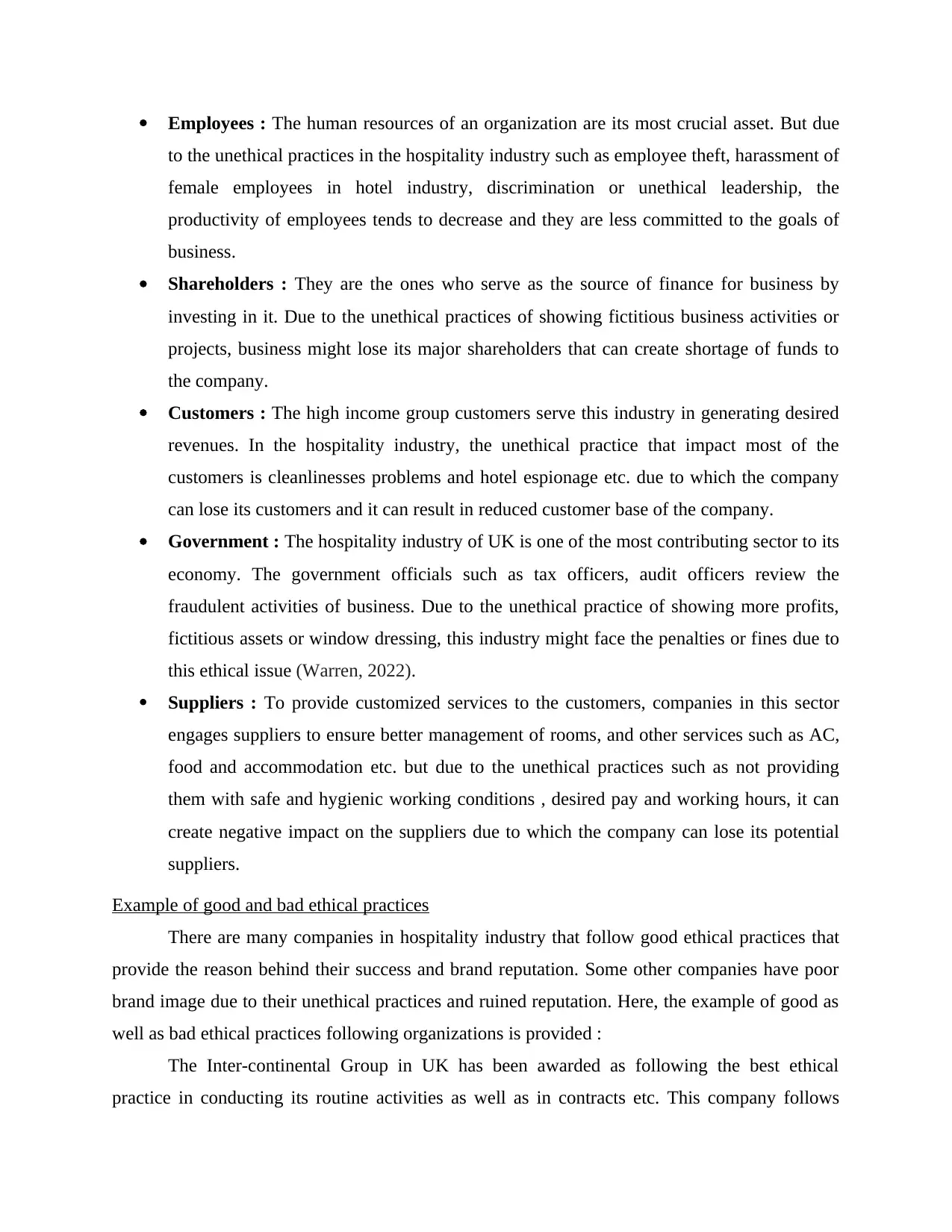
Employees : The human resources of an organization are its most crucial asset. But due
to the unethical practices in the hospitality industry such as employee theft, harassment of
female employees in hotel industry, discrimination or unethical leadership, the
productivity of employees tends to decrease and they are less committed to the goals of
business.
Shareholders : They are the ones who serve as the source of finance for business by
investing in it. Due to the unethical practices of showing fictitious business activities or
projects, business might lose its major shareholders that can create shortage of funds to
the company.
Customers : The high income group customers serve this industry in generating desired
revenues. In the hospitality industry, the unethical practice that impact most of the
customers is cleanlinesses problems and hotel espionage etc. due to which the company
can lose its customers and it can result in reduced customer base of the company.
Government : The hospitality industry of UK is one of the most contributing sector to its
economy. The government officials such as tax officers, audit officers review the
fraudulent activities of business. Due to the unethical practice of showing more profits,
fictitious assets or window dressing, this industry might face the penalties or fines due to
this ethical issue (Warren, 2022).
Suppliers : To provide customized services to the customers, companies in this sector
engages suppliers to ensure better management of rooms, and other services such as AC,
food and accommodation etc. but due to the unethical practices such as not providing
them with safe and hygienic working conditions , desired pay and working hours, it can
create negative impact on the suppliers due to which the company can lose its potential
suppliers.
Example of good and bad ethical practices
There are many companies in hospitality industry that follow good ethical practices that
provide the reason behind their success and brand reputation. Some other companies have poor
brand image due to their unethical practices and ruined reputation. Here, the example of good as
well as bad ethical practices following organizations is provided :
The Inter-continental Group in UK has been awarded as following the best ethical
practice in conducting its routine activities as well as in contracts etc. This company follows
to the unethical practices in the hospitality industry such as employee theft, harassment of
female employees in hotel industry, discrimination or unethical leadership, the
productivity of employees tends to decrease and they are less committed to the goals of
business.
Shareholders : They are the ones who serve as the source of finance for business by
investing in it. Due to the unethical practices of showing fictitious business activities or
projects, business might lose its major shareholders that can create shortage of funds to
the company.
Customers : The high income group customers serve this industry in generating desired
revenues. In the hospitality industry, the unethical practice that impact most of the
customers is cleanlinesses problems and hotel espionage etc. due to which the company
can lose its customers and it can result in reduced customer base of the company.
Government : The hospitality industry of UK is one of the most contributing sector to its
economy. The government officials such as tax officers, audit officers review the
fraudulent activities of business. Due to the unethical practice of showing more profits,
fictitious assets or window dressing, this industry might face the penalties or fines due to
this ethical issue (Warren, 2022).
Suppliers : To provide customized services to the customers, companies in this sector
engages suppliers to ensure better management of rooms, and other services such as AC,
food and accommodation etc. but due to the unethical practices such as not providing
them with safe and hygienic working conditions , desired pay and working hours, it can
create negative impact on the suppliers due to which the company can lose its potential
suppliers.
Example of good and bad ethical practices
There are many companies in hospitality industry that follow good ethical practices that
provide the reason behind their success and brand reputation. Some other companies have poor
brand image due to their unethical practices and ruined reputation. Here, the example of good as
well as bad ethical practices following organizations is provided :
The Inter-continental Group in UK has been awarded as following the best ethical
practice in conducting its routine activities as well as in contracts etc. This company follows
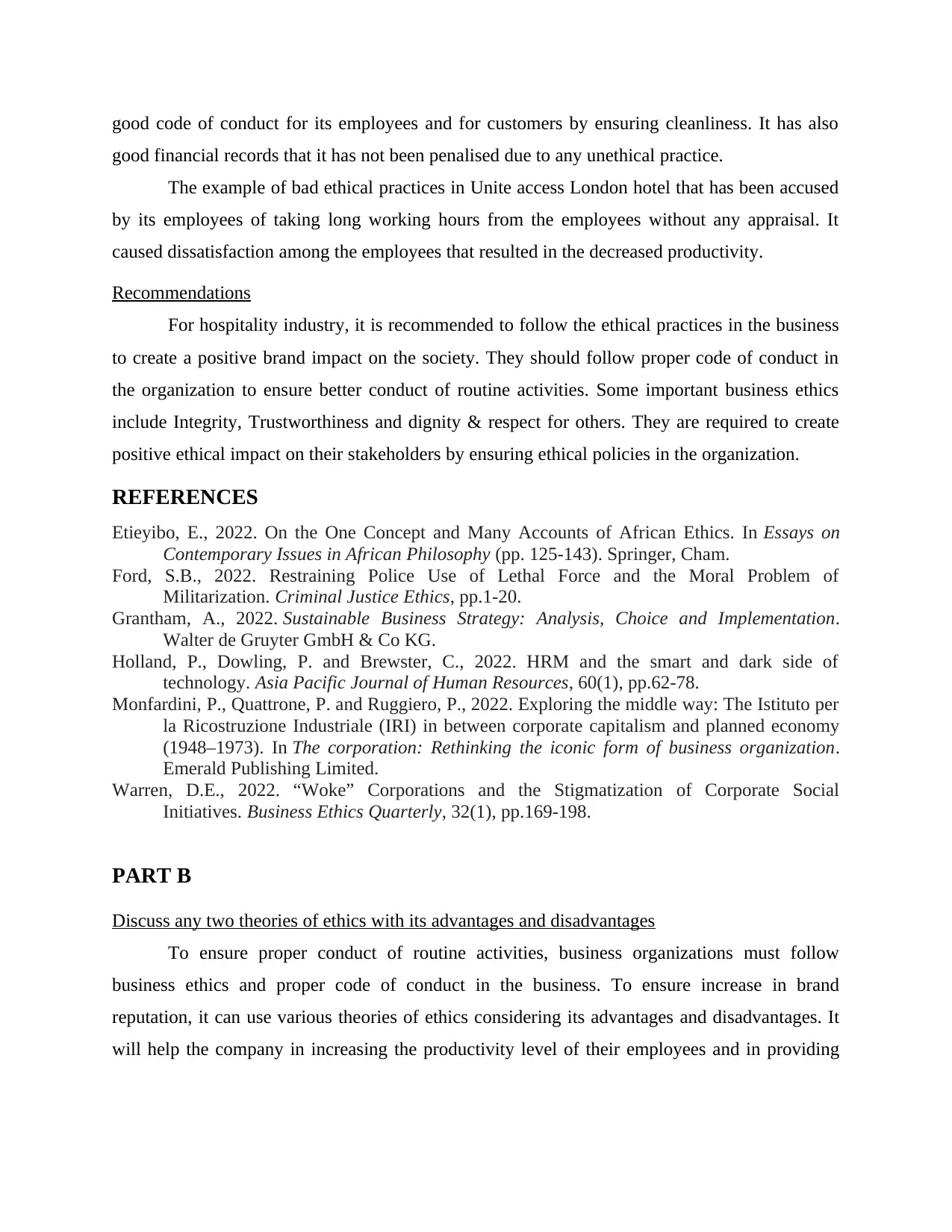
good code of conduct for its employees and for customers by ensuring cleanliness. It has also
good financial records that it has not been penalised due to any unethical practice.
The example of bad ethical practices in Unite access London hotel that has been accused
by its employees of taking long working hours from the employees without any appraisal. It
caused dissatisfaction among the employees that resulted in the decreased productivity.
Recommendations
For hospitality industry, it is recommended to follow the ethical practices in the business
to create a positive brand impact on the society. They should follow proper code of conduct in
the organization to ensure better conduct of routine activities. Some important business ethics
include Integrity, Trustworthiness and dignity & respect for others. They are required to create
positive ethical impact on their stakeholders by ensuring ethical policies in the organization.
REFERENCES
Etieyibo, E., 2022. On the One Concept and Many Accounts of African Ethics. In Essays on
Contemporary Issues in African Philosophy (pp. 125-143). Springer, Cham.
Ford, S.B., 2022. Restraining Police Use of Lethal Force and the Moral Problem of
Militarization. Criminal Justice Ethics, pp.1-20.
Grantham, A., 2022. Sustainable Business Strategy: Analysis, Choice and Implementation.
Walter de Gruyter GmbH & Co KG.
Holland, P., Dowling, P. and Brewster, C., 2022. HRM and the smart and dark side of
technology. Asia Pacific Journal of Human Resources, 60(1), pp.62-78.
Monfardini, P., Quattrone, P. and Ruggiero, P., 2022. Exploring the middle way: The Istituto per
la Ricostruzione Industriale (IRI) in between corporate capitalism and planned economy
(1948–1973). In The corporation: Rethinking the iconic form of business organization.
Emerald Publishing Limited.
Warren, D.E., 2022. “Woke” Corporations and the Stigmatization of Corporate Social
Initiatives. Business Ethics Quarterly, 32(1), pp.169-198.
PART B
Discuss any two theories of ethics with its advantages and disadvantages
To ensure proper conduct of routine activities, business organizations must follow
business ethics and proper code of conduct in the business. To ensure increase in brand
reputation, it can use various theories of ethics considering its advantages and disadvantages. It
will help the company in increasing the productivity level of their employees and in providing
good financial records that it has not been penalised due to any unethical practice.
The example of bad ethical practices in Unite access London hotel that has been accused
by its employees of taking long working hours from the employees without any appraisal. It
caused dissatisfaction among the employees that resulted in the decreased productivity.
Recommendations
For hospitality industry, it is recommended to follow the ethical practices in the business
to create a positive brand impact on the society. They should follow proper code of conduct in
the organization to ensure better conduct of routine activities. Some important business ethics
include Integrity, Trustworthiness and dignity & respect for others. They are required to create
positive ethical impact on their stakeholders by ensuring ethical policies in the organization.
REFERENCES
Etieyibo, E., 2022. On the One Concept and Many Accounts of African Ethics. In Essays on
Contemporary Issues in African Philosophy (pp. 125-143). Springer, Cham.
Ford, S.B., 2022. Restraining Police Use of Lethal Force and the Moral Problem of
Militarization. Criminal Justice Ethics, pp.1-20.
Grantham, A., 2022. Sustainable Business Strategy: Analysis, Choice and Implementation.
Walter de Gruyter GmbH & Co KG.
Holland, P., Dowling, P. and Brewster, C., 2022. HRM and the smart and dark side of
technology. Asia Pacific Journal of Human Resources, 60(1), pp.62-78.
Monfardini, P., Quattrone, P. and Ruggiero, P., 2022. Exploring the middle way: The Istituto per
la Ricostruzione Industriale (IRI) in between corporate capitalism and planned economy
(1948–1973). In The corporation: Rethinking the iconic form of business organization.
Emerald Publishing Limited.
Warren, D.E., 2022. “Woke” Corporations and the Stigmatization of Corporate Social
Initiatives. Business Ethics Quarterly, 32(1), pp.169-198.
PART B
Discuss any two theories of ethics with its advantages and disadvantages
To ensure proper conduct of routine activities, business organizations must follow
business ethics and proper code of conduct in the business. To ensure increase in brand
reputation, it can use various theories of ethics considering its advantages and disadvantages. It
will help the company in increasing the productivity level of their employees and in providing
⊘ This is a preview!⊘
Do you want full access?
Subscribe today to unlock all pages.

Trusted by 1+ million students worldwide
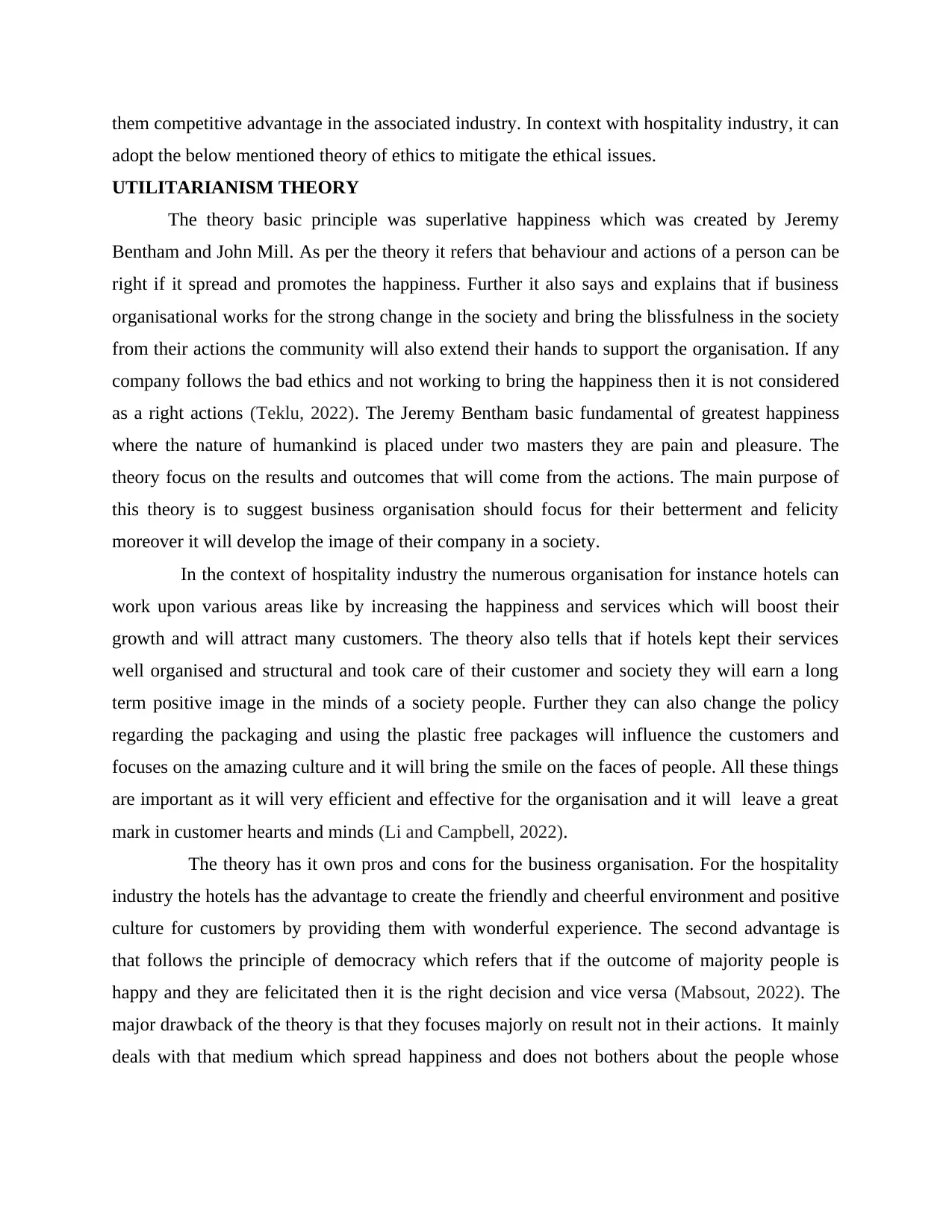
them competitive advantage in the associated industry. In context with hospitality industry, it can
adopt the below mentioned theory of ethics to mitigate the ethical issues.
UTILITARIANISM THEORY
The theory basic principle was superlative happiness which was created by Jeremy
Bentham and John Mill. As per the theory it refers that behaviour and actions of a person can be
right if it spread and promotes the happiness. Further it also says and explains that if business
organisational works for the strong change in the society and bring the blissfulness in the society
from their actions the community will also extend their hands to support the organisation. If any
company follows the bad ethics and not working to bring the happiness then it is not considered
as a right actions (Teklu, 2022). The Jeremy Bentham basic fundamental of greatest happiness
where the nature of humankind is placed under two masters they are pain and pleasure. The
theory focus on the results and outcomes that will come from the actions. The main purpose of
this theory is to suggest business organisation should focus for their betterment and felicity
moreover it will develop the image of their company in a society.
In the context of hospitality industry the numerous organisation for instance hotels can
work upon various areas like by increasing the happiness and services which will boost their
growth and will attract many customers. The theory also tells that if hotels kept their services
well organised and structural and took care of their customer and society they will earn a long
term positive image in the minds of a society people. Further they can also change the policy
regarding the packaging and using the plastic free packages will influence the customers and
focuses on the amazing culture and it will bring the smile on the faces of people. All these things
are important as it will very efficient and effective for the organisation and it will leave a great
mark in customer hearts and minds (Li and Campbell, 2022).
The theory has it own pros and cons for the business organisation. For the hospitality
industry the hotels has the advantage to create the friendly and cheerful environment and positive
culture for customers by providing them with wonderful experience. The second advantage is
that follows the principle of democracy which refers that if the outcome of majority people is
happy and they are felicitated then it is the right decision and vice versa (Mabsout, 2022). The
major drawback of the theory is that they focuses majorly on result not in their actions. It mainly
deals with that medium which spread happiness and does not bothers about the people whose
adopt the below mentioned theory of ethics to mitigate the ethical issues.
UTILITARIANISM THEORY
The theory basic principle was superlative happiness which was created by Jeremy
Bentham and John Mill. As per the theory it refers that behaviour and actions of a person can be
right if it spread and promotes the happiness. Further it also says and explains that if business
organisational works for the strong change in the society and bring the blissfulness in the society
from their actions the community will also extend their hands to support the organisation. If any
company follows the bad ethics and not working to bring the happiness then it is not considered
as a right actions (Teklu, 2022). The Jeremy Bentham basic fundamental of greatest happiness
where the nature of humankind is placed under two masters they are pain and pleasure. The
theory focus on the results and outcomes that will come from the actions. The main purpose of
this theory is to suggest business organisation should focus for their betterment and felicity
moreover it will develop the image of their company in a society.
In the context of hospitality industry the numerous organisation for instance hotels can
work upon various areas like by increasing the happiness and services which will boost their
growth and will attract many customers. The theory also tells that if hotels kept their services
well organised and structural and took care of their customer and society they will earn a long
term positive image in the minds of a society people. Further they can also change the policy
regarding the packaging and using the plastic free packages will influence the customers and
focuses on the amazing culture and it will bring the smile on the faces of people. All these things
are important as it will very efficient and effective for the organisation and it will leave a great
mark in customer hearts and minds (Li and Campbell, 2022).
The theory has it own pros and cons for the business organisation. For the hospitality
industry the hotels has the advantage to create the friendly and cheerful environment and positive
culture for customers by providing them with wonderful experience. The second advantage is
that follows the principle of democracy which refers that if the outcome of majority people is
happy and they are felicitated then it is the right decision and vice versa (Mabsout, 2022). The
major drawback of the theory is that they focuses majorly on result not in their actions. It mainly
deals with that medium which spread happiness and does not bothers about the people whose
Paraphrase This Document
Need a fresh take? Get an instant paraphrase of this document with our AI Paraphraser
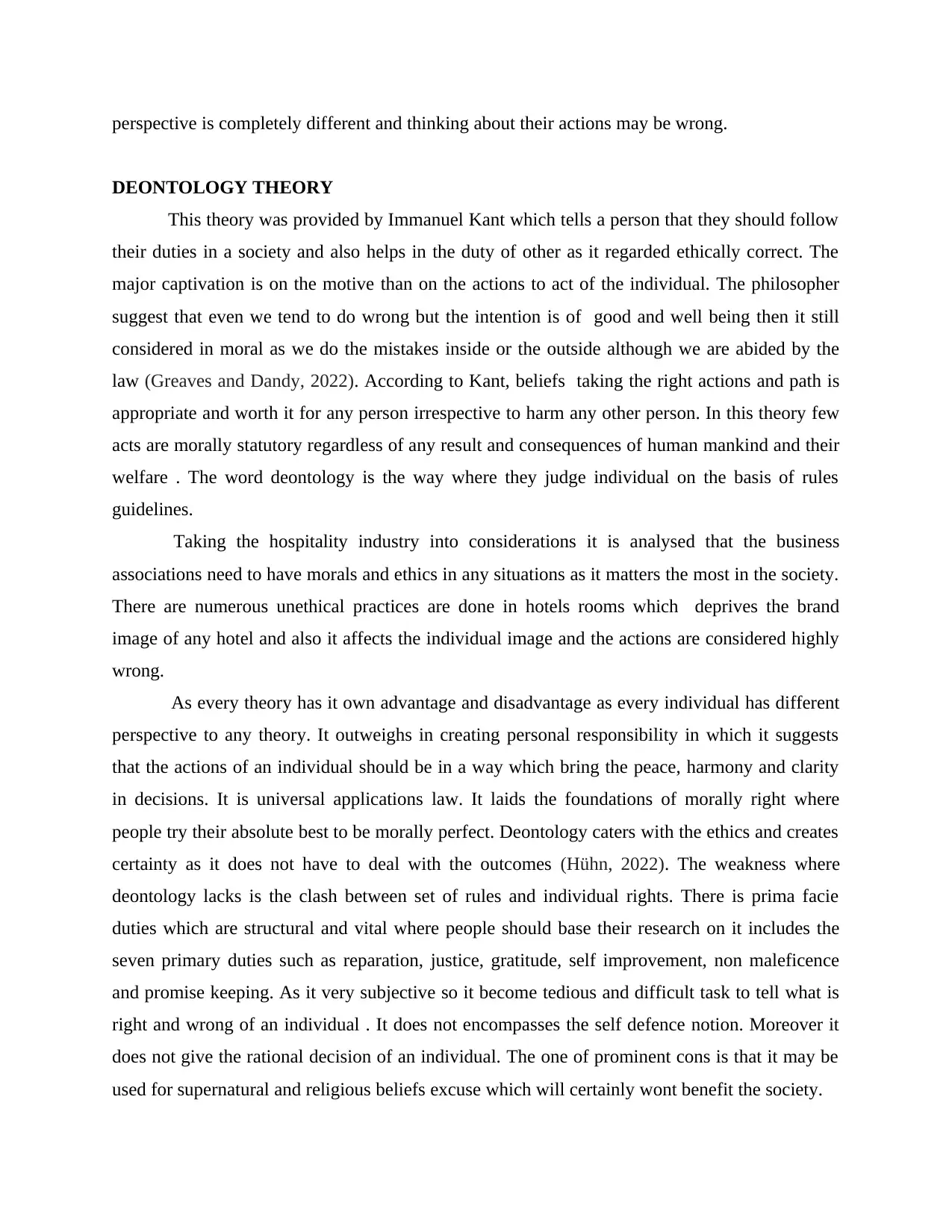
perspective is completely different and thinking about their actions may be wrong.
DEONTOLOGY THEORY
This theory was provided by Immanuel Kant which tells a person that they should follow
their duties in a society and also helps in the duty of other as it regarded ethically correct. The
major captivation is on the motive than on the actions to act of the individual. The philosopher
suggest that even we tend to do wrong but the intention is of good and well being then it still
considered in moral as we do the mistakes inside or the outside although we are abided by the
law (Greaves and Dandy, 2022). According to Kant, beliefs taking the right actions and path is
appropriate and worth it for any person irrespective to harm any other person. In this theory few
acts are morally statutory regardless of any result and consequences of human mankind and their
welfare . The word deontology is the way where they judge individual on the basis of rules
guidelines.
Taking the hospitality industry into considerations it is analysed that the business
associations need to have morals and ethics in any situations as it matters the most in the society.
There are numerous unethical practices are done in hotels rooms which deprives the brand
image of any hotel and also it affects the individual image and the actions are considered highly
wrong.
As every theory has it own advantage and disadvantage as every individual has different
perspective to any theory. It outweighs in creating personal responsibility in which it suggests
that the actions of an individual should be in a way which bring the peace, harmony and clarity
in decisions. It is universal applications law. It laids the foundations of morally right where
people try their absolute best to be morally perfect. Deontology caters with the ethics and creates
certainty as it does not have to deal with the outcomes (Hühn, 2022). The weakness where
deontology lacks is the clash between set of rules and individual rights. There is prima facie
duties which are structural and vital where people should base their research on it includes the
seven primary duties such as reparation, justice, gratitude, self improvement, non maleficence
and promise keeping. As it very subjective so it become tedious and difficult task to tell what is
right and wrong of an individual . It does not encompasses the self defence notion. Moreover it
does not give the rational decision of an individual. The one of prominent cons is that it may be
used for supernatural and religious beliefs excuse which will certainly wont benefit the society.
DEONTOLOGY THEORY
This theory was provided by Immanuel Kant which tells a person that they should follow
their duties in a society and also helps in the duty of other as it regarded ethically correct. The
major captivation is on the motive than on the actions to act of the individual. The philosopher
suggest that even we tend to do wrong but the intention is of good and well being then it still
considered in moral as we do the mistakes inside or the outside although we are abided by the
law (Greaves and Dandy, 2022). According to Kant, beliefs taking the right actions and path is
appropriate and worth it for any person irrespective to harm any other person. In this theory few
acts are morally statutory regardless of any result and consequences of human mankind and their
welfare . The word deontology is the way where they judge individual on the basis of rules
guidelines.
Taking the hospitality industry into considerations it is analysed that the business
associations need to have morals and ethics in any situations as it matters the most in the society.
There are numerous unethical practices are done in hotels rooms which deprives the brand
image of any hotel and also it affects the individual image and the actions are considered highly
wrong.
As every theory has it own advantage and disadvantage as every individual has different
perspective to any theory. It outweighs in creating personal responsibility in which it suggests
that the actions of an individual should be in a way which bring the peace, harmony and clarity
in decisions. It is universal applications law. It laids the foundations of morally right where
people try their absolute best to be morally perfect. Deontology caters with the ethics and creates
certainty as it does not have to deal with the outcomes (Hühn, 2022). The weakness where
deontology lacks is the clash between set of rules and individual rights. There is prima facie
duties which are structural and vital where people should base their research on it includes the
seven primary duties such as reparation, justice, gratitude, self improvement, non maleficence
and promise keeping. As it very subjective so it become tedious and difficult task to tell what is
right and wrong of an individual . It does not encompasses the self defence notion. Moreover it
does not give the rational decision of an individual. The one of prominent cons is that it may be
used for supernatural and religious beliefs excuse which will certainly wont benefit the society.
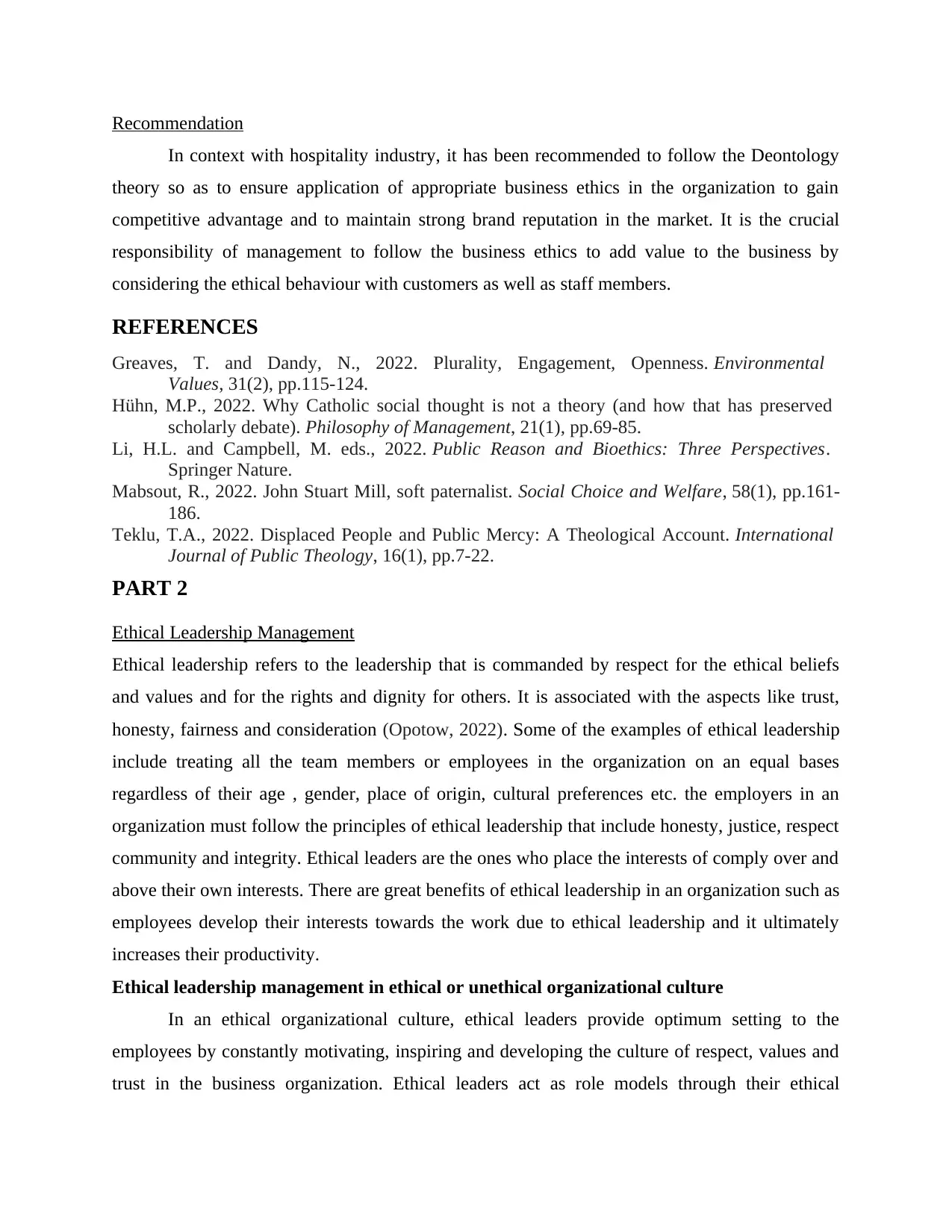
Recommendation
In context with hospitality industry, it has been recommended to follow the Deontology
theory so as to ensure application of appropriate business ethics in the organization to gain
competitive advantage and to maintain strong brand reputation in the market. It is the crucial
responsibility of management to follow the business ethics to add value to the business by
considering the ethical behaviour with customers as well as staff members.
REFERENCES
Greaves, T. and Dandy, N., 2022. Plurality, Engagement, Openness. Environmental
Values, 31(2), pp.115-124.
Hühn, M.P., 2022. Why Catholic social thought is not a theory (and how that has preserved
scholarly debate). Philosophy of Management, 21(1), pp.69-85.
Li, H.L. and Campbell, M. eds., 2022. Public Reason and Bioethics: Three Perspectives.
Springer Nature.
Mabsout, R., 2022. John Stuart Mill, soft paternalist. Social Choice and Welfare, 58(1), pp.161-
186.
Teklu, T.A., 2022. Displaced People and Public Mercy: A Theological Account. International
Journal of Public Theology, 16(1), pp.7-22.
PART 2
Ethical Leadership Management
Ethical leadership refers to the leadership that is commanded by respect for the ethical beliefs
and values and for the rights and dignity for others. It is associated with the aspects like trust,
honesty, fairness and consideration (Opotow, 2022). Some of the examples of ethical leadership
include treating all the team members or employees in the organization on an equal bases
regardless of their age , gender, place of origin, cultural preferences etc. the employers in an
organization must follow the principles of ethical leadership that include honesty, justice, respect
community and integrity. Ethical leaders are the ones who place the interests of comply over and
above their own interests. There are great benefits of ethical leadership in an organization such as
employees develop their interests towards the work due to ethical leadership and it ultimately
increases their productivity.
Ethical leadership management in ethical or unethical organizational culture
In an ethical organizational culture, ethical leaders provide optimum setting to the
employees by constantly motivating, inspiring and developing the culture of respect, values and
trust in the business organization. Ethical leaders act as role models through their ethical
In context with hospitality industry, it has been recommended to follow the Deontology
theory so as to ensure application of appropriate business ethics in the organization to gain
competitive advantage and to maintain strong brand reputation in the market. It is the crucial
responsibility of management to follow the business ethics to add value to the business by
considering the ethical behaviour with customers as well as staff members.
REFERENCES
Greaves, T. and Dandy, N., 2022. Plurality, Engagement, Openness. Environmental
Values, 31(2), pp.115-124.
Hühn, M.P., 2022. Why Catholic social thought is not a theory (and how that has preserved
scholarly debate). Philosophy of Management, 21(1), pp.69-85.
Li, H.L. and Campbell, M. eds., 2022. Public Reason and Bioethics: Three Perspectives.
Springer Nature.
Mabsout, R., 2022. John Stuart Mill, soft paternalist. Social Choice and Welfare, 58(1), pp.161-
186.
Teklu, T.A., 2022. Displaced People and Public Mercy: A Theological Account. International
Journal of Public Theology, 16(1), pp.7-22.
PART 2
Ethical Leadership Management
Ethical leadership refers to the leadership that is commanded by respect for the ethical beliefs
and values and for the rights and dignity for others. It is associated with the aspects like trust,
honesty, fairness and consideration (Opotow, 2022). Some of the examples of ethical leadership
include treating all the team members or employees in the organization on an equal bases
regardless of their age , gender, place of origin, cultural preferences etc. the employers in an
organization must follow the principles of ethical leadership that include honesty, justice, respect
community and integrity. Ethical leaders are the ones who place the interests of comply over and
above their own interests. There are great benefits of ethical leadership in an organization such as
employees develop their interests towards the work due to ethical leadership and it ultimately
increases their productivity.
Ethical leadership management in ethical or unethical organizational culture
In an ethical organizational culture, ethical leaders provide optimum setting to the
employees by constantly motivating, inspiring and developing the culture of respect, values and
trust in the business organization. Ethical leaders act as role models through their ethical
⊘ This is a preview!⊘
Do you want full access?
Subscribe today to unlock all pages.

Trusted by 1+ million students worldwide
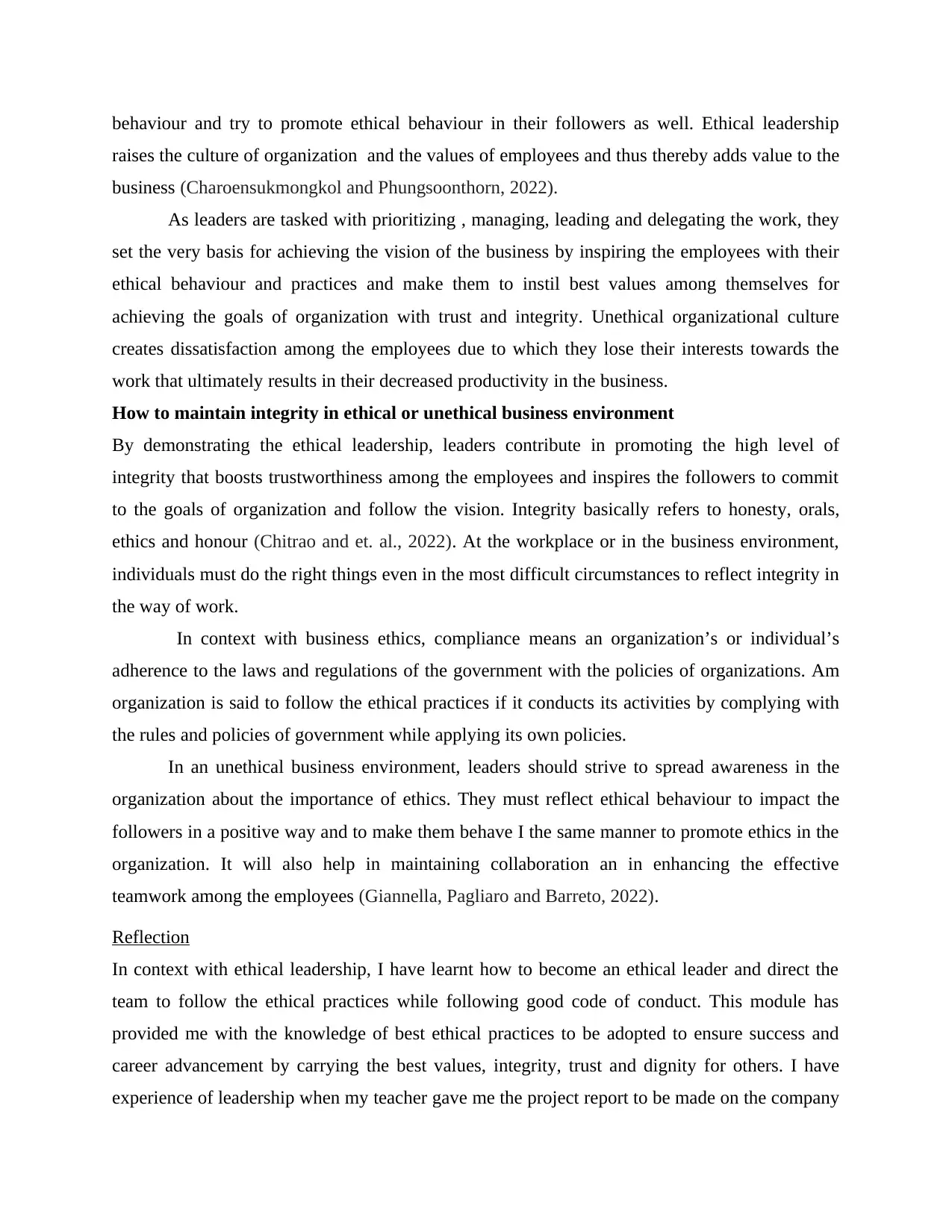
behaviour and try to promote ethical behaviour in their followers as well. Ethical leadership
raises the culture of organization and the values of employees and thus thereby adds value to the
business (Charoensukmongkol and Phungsoonthorn, 2022).
As leaders are tasked with prioritizing , managing, leading and delegating the work, they
set the very basis for achieving the vision of the business by inspiring the employees with their
ethical behaviour and practices and make them to instil best values among themselves for
achieving the goals of organization with trust and integrity. Unethical organizational culture
creates dissatisfaction among the employees due to which they lose their interests towards the
work that ultimately results in their decreased productivity in the business.
How to maintain integrity in ethical or unethical business environment
By demonstrating the ethical leadership, leaders contribute in promoting the high level of
integrity that boosts trustworthiness among the employees and inspires the followers to commit
to the goals of organization and follow the vision. Integrity basically refers to honesty, orals,
ethics and honour (Chitrao and et. al., 2022). At the workplace or in the business environment,
individuals must do the right things even in the most difficult circumstances to reflect integrity in
the way of work.
In context with business ethics, compliance means an organization’s or individual’s
adherence to the laws and regulations of the government with the policies of organizations. Am
organization is said to follow the ethical practices if it conducts its activities by complying with
the rules and policies of government while applying its own policies.
In an unethical business environment, leaders should strive to spread awareness in the
organization about the importance of ethics. They must reflect ethical behaviour to impact the
followers in a positive way and to make them behave I the same manner to promote ethics in the
organization. It will also help in maintaining collaboration an in enhancing the effective
teamwork among the employees (Giannella, Pagliaro and Barreto, 2022).
Reflection
In context with ethical leadership, I have learnt how to become an ethical leader and direct the
team to follow the ethical practices while following good code of conduct. This module has
provided me with the knowledge of best ethical practices to be adopted to ensure success and
career advancement by carrying the best values, integrity, trust and dignity for others. I have
experience of leadership when my teacher gave me the project report to be made on the company
raises the culture of organization and the values of employees and thus thereby adds value to the
business (Charoensukmongkol and Phungsoonthorn, 2022).
As leaders are tasked with prioritizing , managing, leading and delegating the work, they
set the very basis for achieving the vision of the business by inspiring the employees with their
ethical behaviour and practices and make them to instil best values among themselves for
achieving the goals of organization with trust and integrity. Unethical organizational culture
creates dissatisfaction among the employees due to which they lose their interests towards the
work that ultimately results in their decreased productivity in the business.
How to maintain integrity in ethical or unethical business environment
By demonstrating the ethical leadership, leaders contribute in promoting the high level of
integrity that boosts trustworthiness among the employees and inspires the followers to commit
to the goals of organization and follow the vision. Integrity basically refers to honesty, orals,
ethics and honour (Chitrao and et. al., 2022). At the workplace or in the business environment,
individuals must do the right things even in the most difficult circumstances to reflect integrity in
the way of work.
In context with business ethics, compliance means an organization’s or individual’s
adherence to the laws and regulations of the government with the policies of organizations. Am
organization is said to follow the ethical practices if it conducts its activities by complying with
the rules and policies of government while applying its own policies.
In an unethical business environment, leaders should strive to spread awareness in the
organization about the importance of ethics. They must reflect ethical behaviour to impact the
followers in a positive way and to make them behave I the same manner to promote ethics in the
organization. It will also help in maintaining collaboration an in enhancing the effective
teamwork among the employees (Giannella, Pagliaro and Barreto, 2022).
Reflection
In context with ethical leadership, I have learnt how to become an ethical leader and direct the
team to follow the ethical practices while following good code of conduct. This module has
provided me with the knowledge of best ethical practices to be adopted to ensure success and
career advancement by carrying the best values, integrity, trust and dignity for others. I have
experience of leadership when my teacher gave me the project report to be made on the company
Paraphrase This Document
Need a fresh take? Get an instant paraphrase of this document with our AI Paraphraser
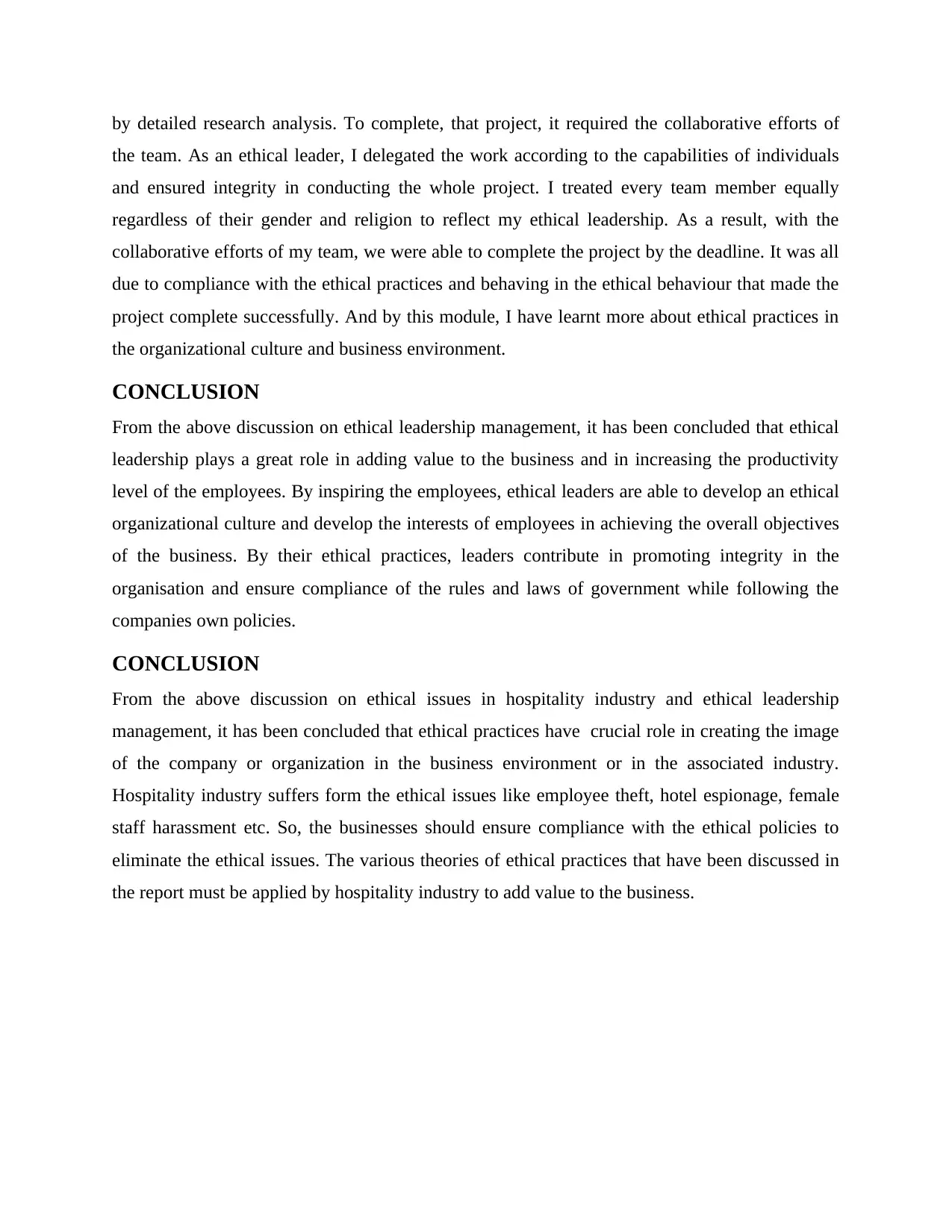
by detailed research analysis. To complete, that project, it required the collaborative efforts of
the team. As an ethical leader, I delegated the work according to the capabilities of individuals
and ensured integrity in conducting the whole project. I treated every team member equally
regardless of their gender and religion to reflect my ethical leadership. As a result, with the
collaborative efforts of my team, we were able to complete the project by the deadline. It was all
due to compliance with the ethical practices and behaving in the ethical behaviour that made the
project complete successfully. And by this module, I have learnt more about ethical practices in
the organizational culture and business environment.
CONCLUSION
From the above discussion on ethical leadership management, it has been concluded that ethical
leadership plays a great role in adding value to the business and in increasing the productivity
level of the employees. By inspiring the employees, ethical leaders are able to develop an ethical
organizational culture and develop the interests of employees in achieving the overall objectives
of the business. By their ethical practices, leaders contribute in promoting integrity in the
organisation and ensure compliance of the rules and laws of government while following the
companies own policies.
CONCLUSION
From the above discussion on ethical issues in hospitality industry and ethical leadership
management, it has been concluded that ethical practices have crucial role in creating the image
of the company or organization in the business environment or in the associated industry.
Hospitality industry suffers form the ethical issues like employee theft, hotel espionage, female
staff harassment etc. So, the businesses should ensure compliance with the ethical policies to
eliminate the ethical issues. The various theories of ethical practices that have been discussed in
the report must be applied by hospitality industry to add value to the business.
the team. As an ethical leader, I delegated the work according to the capabilities of individuals
and ensured integrity in conducting the whole project. I treated every team member equally
regardless of their gender and religion to reflect my ethical leadership. As a result, with the
collaborative efforts of my team, we were able to complete the project by the deadline. It was all
due to compliance with the ethical practices and behaving in the ethical behaviour that made the
project complete successfully. And by this module, I have learnt more about ethical practices in
the organizational culture and business environment.
CONCLUSION
From the above discussion on ethical leadership management, it has been concluded that ethical
leadership plays a great role in adding value to the business and in increasing the productivity
level of the employees. By inspiring the employees, ethical leaders are able to develop an ethical
organizational culture and develop the interests of employees in achieving the overall objectives
of the business. By their ethical practices, leaders contribute in promoting integrity in the
organisation and ensure compliance of the rules and laws of government while following the
companies own policies.
CONCLUSION
From the above discussion on ethical issues in hospitality industry and ethical leadership
management, it has been concluded that ethical practices have crucial role in creating the image
of the company or organization in the business environment or in the associated industry.
Hospitality industry suffers form the ethical issues like employee theft, hotel espionage, female
staff harassment etc. So, the businesses should ensure compliance with the ethical policies to
eliminate the ethical issues. The various theories of ethical practices that have been discussed in
the report must be applied by hospitality industry to add value to the business.
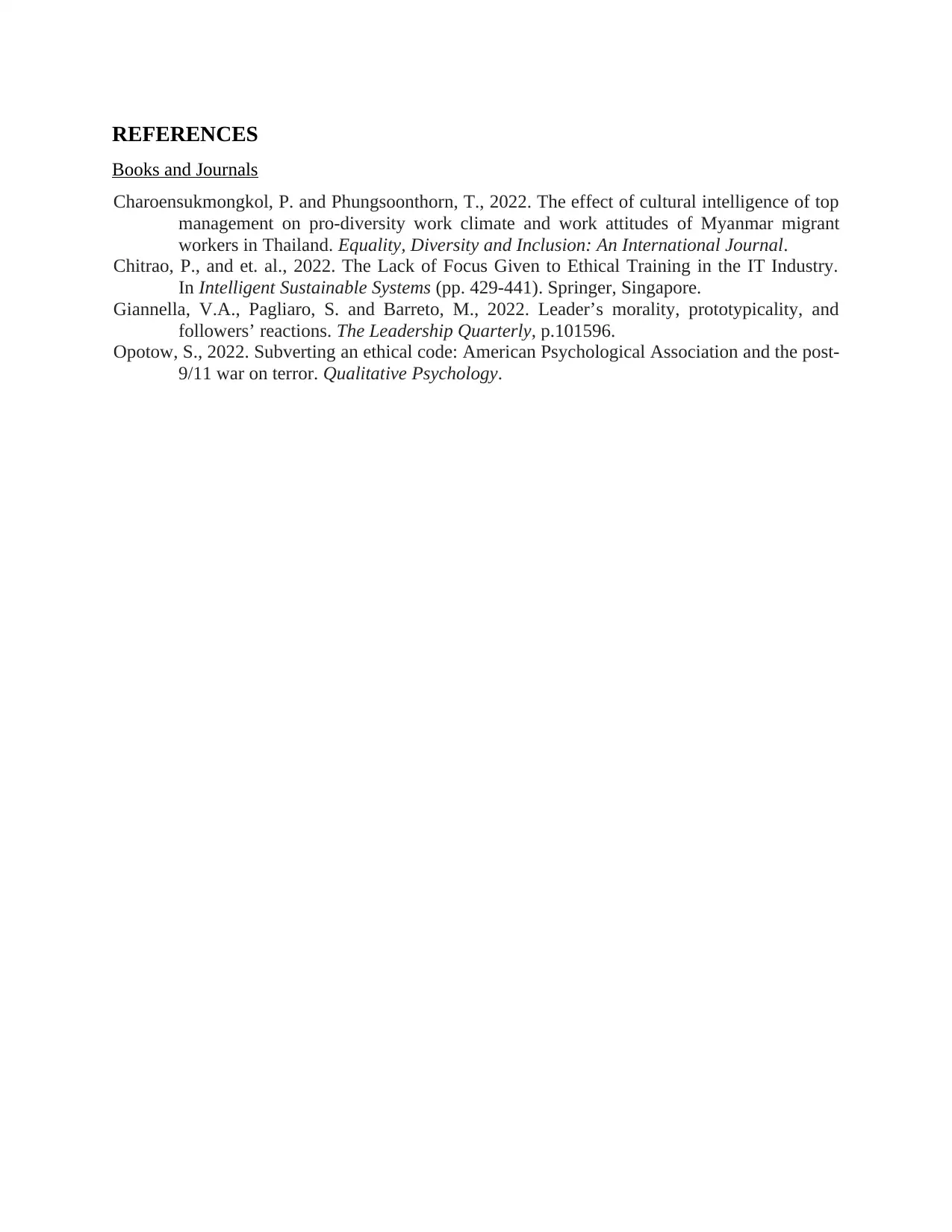
REFERENCES
Books and Journals
Charoensukmongkol, P. and Phungsoonthorn, T., 2022. The effect of cultural intelligence of top
management on pro-diversity work climate and work attitudes of Myanmar migrant
workers in Thailand. Equality, Diversity and Inclusion: An International Journal.
Chitrao, P., and et. al., 2022. The Lack of Focus Given to Ethical Training in the IT Industry.
In Intelligent Sustainable Systems (pp. 429-441). Springer, Singapore.
Giannella, V.A., Pagliaro, S. and Barreto, M., 2022. Leader’s morality, prototypicality, and
followers’ reactions. The Leadership Quarterly, p.101596.
Opotow, S., 2022. Subverting an ethical code: American Psychological Association and the post-
9/11 war on terror. Qualitative Psychology.
Books and Journals
Charoensukmongkol, P. and Phungsoonthorn, T., 2022. The effect of cultural intelligence of top
management on pro-diversity work climate and work attitudes of Myanmar migrant
workers in Thailand. Equality, Diversity and Inclusion: An International Journal.
Chitrao, P., and et. al., 2022. The Lack of Focus Given to Ethical Training in the IT Industry.
In Intelligent Sustainable Systems (pp. 429-441). Springer, Singapore.
Giannella, V.A., Pagliaro, S. and Barreto, M., 2022. Leader’s morality, prototypicality, and
followers’ reactions. The Leadership Quarterly, p.101596.
Opotow, S., 2022. Subverting an ethical code: American Psychological Association and the post-
9/11 war on terror. Qualitative Psychology.
⊘ This is a preview!⊘
Do you want full access?
Subscribe today to unlock all pages.

Trusted by 1+ million students worldwide
1 out of 12
Related Documents
Your All-in-One AI-Powered Toolkit for Academic Success.
+13062052269
info@desklib.com
Available 24*7 on WhatsApp / Email
![[object Object]](/_next/static/media/star-bottom.7253800d.svg)
Unlock your academic potential
Copyright © 2020–2026 A2Z Services. All Rights Reserved. Developed and managed by ZUCOL.




